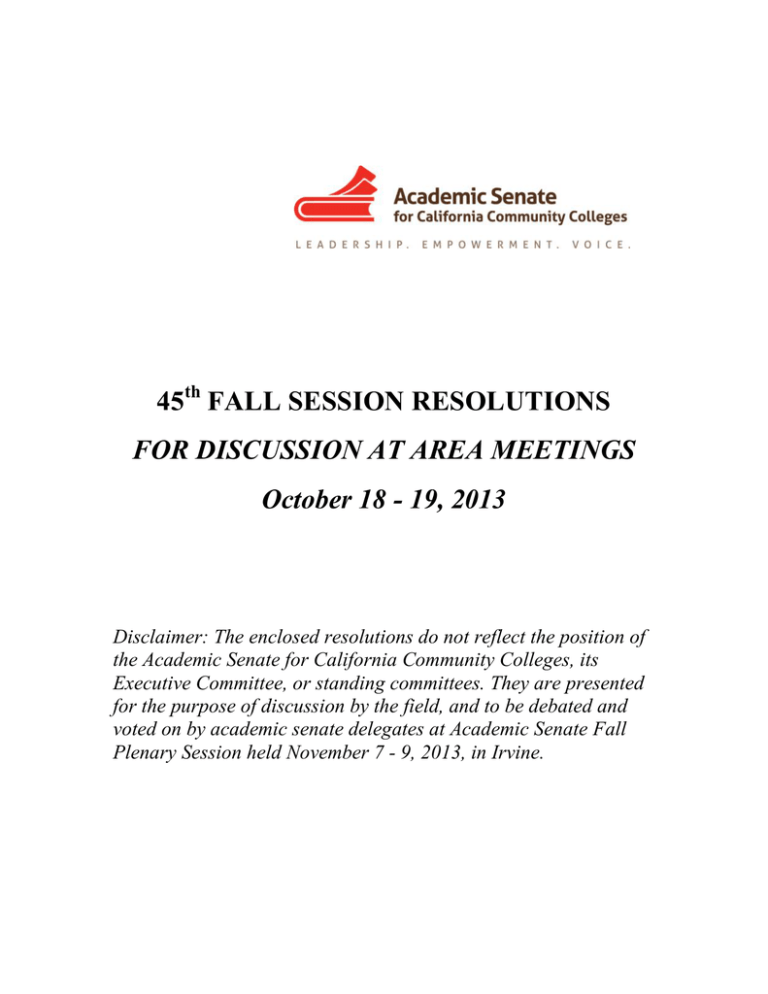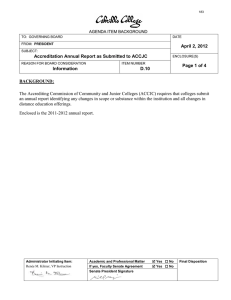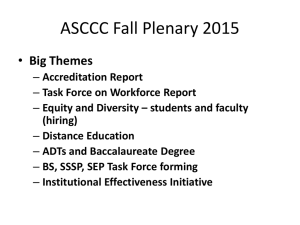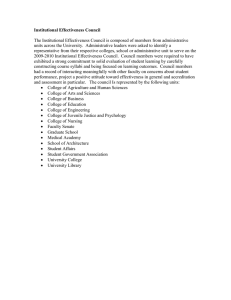45 FALL SESSION RESOLUTIONS FOR DISCUSSION AT AREA MEETINGS
advertisement

45th FALL SESSION RESOLUTIONS FOR DISCUSSION AT AREA MEETINGS October 18 - 19, 2013 Disclaimer: The enclosed resolutions do not reflect the position of the Academic Senate for California Community Colleges, its Executive Committee, or standing committees. They are presented for the purpose of discussion by the field, and to be debated and voted on by academic senate delegates at Academic Senate Fall Plenary Session held November 7 - 9, 2013, in Irvine. EXECUTIVE COMMITTEE RESOLUTIONS 2.0 2.01 ACCREDITATION STANDARDS F13 ASCCC Statement on Accreditation Whereas, The “faculty roles and involvement in accreditation processes, including self study and annual reports” is one of the “10+1” academic and professional matters designated to academic senates in Title 5 section 53200; Whereas, The Academic Senate for California Community Colleges (ASCCC) has been intricately involved in accreditation processes since its founding and continues to actively support faculty and colleges in their accreditation work through breakouts presented at plenary sessions, Rostrum articles, Senate position papers, its standing Accreditation and Assessment Committee, and its annual Accreditation Institute; Whereas, The ASCCC further provides colleges, upon request, with Accreditation Response Teams consisting primarily of faculty experienced in various areas of accreditation, in order to assist colleges that are facing sanctions or are otherwise concerned with the involvement and roles of faculty in regards to accreditation processes within their own college governance structures; and Whereas, Despite the ASCCC’s strong advocacy for and assistance with “faculty roles and involvement in accreditation processes” and extensive set of adopted positions to that effect, the ASCCC currently has no a statement regarding the ASCCC’s responsibility with respect to accreditation; Resolved, That the Academic Senate for California Community Colleges adopt the following statement on accreditation to be used to guide the ASCCC in its ongoing work to support college accreditation efforts: The Academic Senate for California Community Colleges (ASCCC) values the peer review process of self-reflection and improvement known as accreditation. Since local academic senates are given Title 5-designated roles within the accreditation process, the ASCCC sees its primary responsibility as helping colleges to meet the adopted standards for which they will be held accountable and to generate comprehensive and forthright assessments of progress toward the standards. The ASCCC’s main tool for supporting colleges is the annual Accreditation Institute through which faculty and other colleagues are encouraged to learn about and address the standards and recommendations from the Accrediting Commission for Community and Junior Colleges. Additionally, the Academic Senate shares accreditation information and provides support through local college visits and regional presentations. As a professional matter, in support of the ideal of a fair and meaningful accreditation process, the ASCCC’s secondary responsibility is to recommend improvements to the accreditation standards and processes 1 EXECUTIVE COMMITTEE RESOLUTIONS by providing thoughtful feedback and input to all accreditation participants; and Resolved, That the Academic Senate for California Community Colleges publish the statement widely. Contact: Phil Smith, Chair, Accreditation Committee 2.02 F13 Request of ACCJC to Model Effective Self-Evaluation Practices Whereas, The Academic Senate for California Community Colleges has expressed various concerns with the Accrediting Commission for Community and Junior Colleges (ACCJC) regarding faculty participation and representation on the Commission’s committees and on on-site evaluation teams through a variety of means, including resolutions passed by the body, concerns expressed to the California Community College Chancellor’s Office, and the Board of Governors, and letters sent by the Academic Senate to the U.S. Department of Education (USDE)1; and Whereas, The ACCJC expects its member institutions to reflect honestly and critically about areas identified as being non-compliant with Commission policies and accreditation standards and to address them in a timely manner; Resolved, That the Academic Senate for California Community Colleges urge the ACCJC to model and exemplify for its member institutions effective self-evaluation practices by acknowledging and addressing any areas of non-compliance identified in evaluations by the USDE’s Accreditation Group and the National Advisory Committee on Institutional Quality and Improvement (NACIQI), and to document what steps it will take to address any areas of non-compliance. Contact: Dolores Davison, Past Chair, Accreditation Committee 1 Official expressions of concern about lack of faculty representation on ACCJC teams and committees include resolutions passed by the body dating back to 2004 that describe inadequate faculty representation on accreditation visiting teams, a letter sent in 2010 by then-President Jane Patton expressing concerns about the ACCJC not observing its bylaws regarding faculty appointments to the ACCJC Commissioner Selection Committee, and a third-party comment sent to the USDE in September 2013 by President Beth Smith describing the ongoing concerns the Academic Senate has with the ACCJC with respect to faculty representation. 2 EXECUTIVE COMMITTEE RESOLUTIONS 2.03 F13 Sufficient Advance Notice for Changes to Required ACCJC Annual Reports Whereas, The Accrediting Commission for Community and Junior Colleges (ACCJC) requires member colleges to file Annual Reports and Annual Fiscal Reports to maintain their status as accredited institutions; Whereas, Member colleges have difficulty completing such reports in a meaningful and comprehensive way when the requirements and required data for these reports differ substantially from year to year, and sufficient advance notice and instructions are not provided; and Whereas, Government agencies and professional licensing organizations typically follow a process in which proposed changes to required reports or policies are announced well in advance, with opportunities for comments and suggestions from impacted parties , and with new procedures published with sufficient notice for effective compliance by affected individuals or institutions; Resolved, That the Academic Senate for California Community Colleges formally request that the ACCJC provide member institutions opportunities to provide meaningful input to the ACCJC about any proposed changes to the required annual reports, and that any adopted changes to the annual reports be published at least six months in advance of the date they are due. Contact: Dolores Davison, Past Chair, Accreditation Committee 2.04 F13 Employ the Term “Deficiency” Rather Than “Recommendation” for Evaluation Findings That Must Be Addressed by the Two-Year Rule Whereas, Section 602.20(a) of the Secretary’s Criteria for Recognition mandates that recognized accrediting agencies for institutions such as the California community colleges must either take immediate adverse action against the institution, or give the institution two years to bring itself into compliance (the so-called “Two-Year Rule”); Whereas, The Accrediting Commission for Community and Junior Colleges (ACCJC) currently uses the term “recommendation” in two senses when communicating the Commission’s actions, namely, “to meet the standard” or “to increase institutional effectiveness,” and thus it is unclear which of the “recommendations” issued to member institutions by the ACCJC fall under the Two-Year Rule; Whereas, ACCJC’s use of the term “recommendation” in two different ways concerned the Accreditation Group of the United States Department of Education enough for it to 3 EXECUTIVE COMMITTEE RESOLUTIONS note in its memo to the ACCJC dated August 13, 20032 that “what is not clear is how the recommendations are differentiated between the two types and how an institution, an evaluation team, the Commission, or the public is to know the difference”; Whereas, Given the high stakes involved with receiving one type of recommendation over the other, the California community colleges and their academic senates would benefit from clear distinctions between the types of findings issued them; Resolved, That the Academic Senate for California Community Colleges formally request that the ACCJC adopt and employ the term “deficiency” for those findings of noncompliance that must be addressed under the Two-Year Rule, and reserve the term “recommendation” exclusively for Commission suggestions to increase institutional effectiveness. Contact: Michelle Grimes-Hillman, Past Chair, Accreditation Committee 15.0 INTERSEGMENTAL ISSUES 15.01 F13 Endorse LEAP General Education Outcomes Whereas, The Academic Senate for California Community Colleges has repeatedly noted the essential importance of a robust general education (GE) to becoming a wellrounded, educated citizen, and the Association of American Colleges and Universities (AAC&U) has established essential learning outcomes for a student's general education experience called the Liberal Education and America's Promise (LEAP) outcomes, defined as: Knowledge of Human Cultures and the Physical and Natural World Through study in the sciences and mathematics, social sciences, humanities, histories, languages, and the arts Focused by engagement with big questions, both contemporary and enduring Intellectual and Practical Skills, Including Inquiry and analysis Critical and creative thinking Written and oral communication Quantitative literacy Information literacy Teamwork and problem solving Practiced extensively, across the curriculum, in the context of progressively more challenging problems, projects, and standards for performance Personal and Social Responsibility, Including 2 Letter to the Dr. Barbara Beno, dated August 13, 2013: http://www.accjc.org/wp- content/uploads/2013/08/08_13_2013_Letter_from_USDE_on_Complaint.pdf 4 EXECUTIVE COMMITTEE RESOLUTIONS Civic knowledge and engagement—local and global Intercultural knowledge and competence Ethical reasoning and action Foundations and skills for lifelong learning Anchored through active involvement with diverse communities and realworld challenges Integrative and Applied Learning, Including Synthesis and advanced accomplishment across general and specialized studies Demonstrated through the application of knowledge, skills, and responsibilities to new settings and complex problems; Whereas, The California State University (CSU), by Executive Order 1065 (2011), states: Each CSU campus shall define its GE student learning outcomes, to fit within the framework of the four “Essential Learning Outcomes” drawn from the Liberal Education and American Promise (LEAP) campaign, an initiative of the Association of American Colleges and Universities; Whereas, California community college courses are expected to have course outcomes that connect to program and GE or institutional learning outcomes established by the college, and in the case of GE courses that transfer to CSU, the learning outcomes of those courses should align with CSU expectations; and Whereas, The LEAP outcomes represent minimal standards for learning in courses and GE programs, and colleges may already have similar learning outcomes for GE or institution-wide; Resolved, That the Academic Senate for California Community Colleges endorse the AAC&U LEAP outcomes as minimum standards for GE or institutional learning outcomes. http://www.aacu.org/leap/vision.cfm Contact: David Morse, Vice President, ASCCC 5


